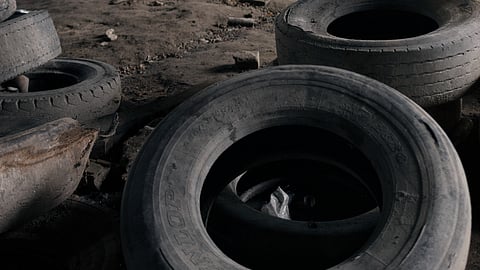Picture this that you drop off your worn-out car tiers at a local garage, pay a modest £3-6 fee, and feel reassured that they’ll be recycled responsibly. But what if those tiers secretly journey halfway across the globe to India, where they’re burned in makeshift furnaces, releasing harmful toxins into unsuspecting communities? That’s the startling revelation from a BBC File on 4 investigation launched in March 2025, shedding light on a profit-driven waste scandal with serious global repercussions.
The UK produces approximately 50 million waste tiers annually, totaling nearly 700,000 tones. Of these, about 25 million tiers equating to 350,000 tones, roughly the weight of the Empire State Building are baled and shipped overseas, predominantly to India. Far from being recycled safely, many end up in illegal pyrolysis plants, where they’re heated to 500°C to extract oil, steel, and carbon black, often in violation of local laws. The UK Environment Agency introduced enhanced verification checks for tier exports to India from October 1, 2025, to address this issue.
The Everyday Start: From Your Garage to a Global Issue
It starts with a routine visit to your garage. That disposal fee you pay when swapping out old tiers is intended to ensure they’re shredded and transformed into useful materials like rubber crumbs for playgrounds or horse arenas. Larger UK recyclers, such as Elliot Mason’s Rubber World in Northampton (in operation since 1996), uphold this standard, processing tiers locally with care.
However, for many smaller dealers, baling tiers into compact cubes offers a cheaper, quicker alternative to investing in shredding equipment. They leverage ‘T8 exemptions,’ which permit handling up to 40 tones weekly without stringent oversight. Yet, investigations reveal many exceed these limits, exporting hundreds of tones illegally. In Rochdale, a BBC undercover operation captured a dealer admitting, “They go to India… They do pyrolysis plant. They’re making furnace oil. They make carbons.” He noted weak oversight allows the practice and called it an ‘open secret’ in the industry.
The Secret Export: A 1,287-Kilometer Journey Unveiled
To trace this hidden trade, BBC File on 4 partnered with SourceMaterial and an industry insider in early 2025. They embedded GPS trackers in tier bales, following an eight-week sea voyage to Indian ports, followed by a 1,287-kilometer trek (800 miles) inland to rural areas. Drone footage exposed vast stockpiles of UK and European tiers at soot-covered compounds clearly not licensed recycling centers.
These sites host pyrolysis plants, often unlicensed ‘pressure cookers’ that heat tiers to extract resources, releasing dangerous gases. Despite India’s 2016 Hazardous and Other Wastes Rules and a 2022 Extended Producer Responsibility (EPR) policy banning tier imports for pyrolysis, an estimated 70% of tiers from the UK and beyond are diverted here, fueling a thriving black market. The Central Pollution Control Board (CPCB) updated guidelines in January 2025 to curb this, but enforcement remains patchy.
The Human Cost: Soot, Explosions, and Silent Suffering
The reality on the ground is grim. BBC teams in India documented villages shrouded in soot, with carbon dust seeping into homes and children playing amidst toxic debris. Residents in Wada, near Mumbai, report persistent coughs, sore throats, and eye irritation, pleading, “We want these companies moved… otherwise we will not be able to breathe freely.” Imperial College London scientists warn of severe health risks like respiratory issues, heart disease, neurological damage, and cancers from prolonged exposure to pyrolysis emissions.
A tragic explosion in January 2025 at a Wada plant processing European tiers killed four, including two children living onsite, with thick smoke billowing into the sky. Authorities shut down seven nearby plants, but follow-ups revealed some resumed operations. One contributor labeled India’s tier disposal a ‘Wild West’ unregulated and perilous.


